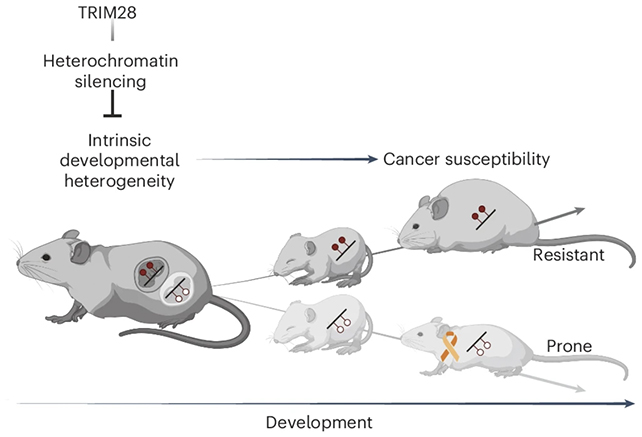
Numerous elements can influence cancer risk, ranging from air pollution which heightens it, to milk consumption that may decrease the risk. A recent study indicates that a person’s likelihood of developing cancer may be influenced even before birth.
This research, led by the Van Andel Institute in the United States, demonstrates that events during prenatal development can be associated with cancer risk, either increasing or decreasing that risk depending on various factors.
In particular, the study identified two distinct epigenetic states—specific patterns of gene activity—that influenced cancer risk in genetically altered mice. The researchers specifically examined the role of the TRIM28 protein as an epigenetic regulator, which activates or silences genes without changing the DNA sequence itself.

The specific configurations of these epigenetic patterns determined whether the mice experienced an increased or decreased risk of cancer as they aged. Although the precise causes of these epigenetic differences remain unknown, the findings indicate that even genetically identical mice can exhibit varying cancer risks based on their developmental experiences.
“Our research suggests that cancer’s origins may trace back to crucial developmental periods, providing a fresh perspective on potential diagnostic and treatment strategies for this disease,” states Ilaria Panzeri, a molecular biologist at the Van Andel Institute.
Furthermore, the study revealed that the types of cancer that developed varied among different groups. Mice in the lower-risk state were more prone to liquid tumors such as leukemia and lymphoma, while those in the higher-risk state more frequently developed solid tumors, including lung and prostate cancer.
It remains uncertain how these two epigenetic conditions (or others) come to be; they could be random occurrences. Previous studies have also suggested connections between external prenatal factors, such as alcohol exposure during pregnancy, and increased cancer risk.
“Traditionally, cancer has been viewed as a late-onset disease primarily driven by genetic mutations, which has led to less emphasis on how developmental stages might influence cancer risk,” observes J. Andrew Pospisilik, director of the Center for Epigenetics at the Van Andel Institute. “Our discoveries challenge that perception.”
“The identification of these two distinct epigenetic states opens up new avenues for investigating the fundamental causes of cancer.”
A clearer understanding of these underlying factors could pave the way for innovative treatment options. Although this research is still in its initial stages, it holds great promise as cancer cases are projected to surge dramatically in the coming years, revealing more of the complexities behind this disease.
“Everyone carries some level of cancer risk, but we often attribute its emergence to chance,” adds Panzeri. “Nevertheless, luck alone cannot explain the disparity between individuals who develop cancer and those who do not.”
“Crucially, you cannot develop targeted therapies for luck. However, epigenetic factors present a targetable pathway for treatment.”
The findings have been published in Nature Cancer.









